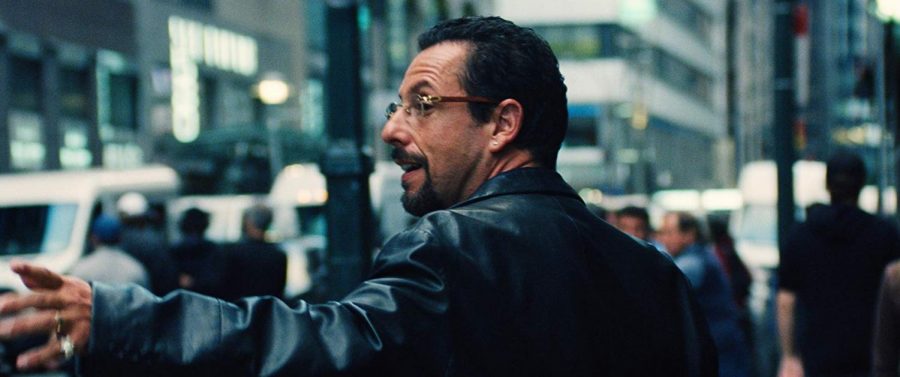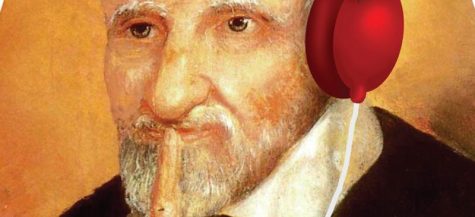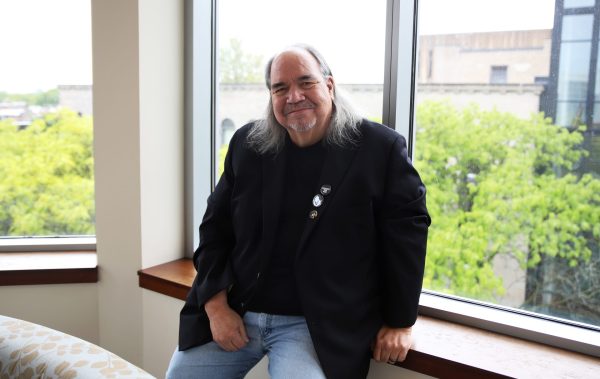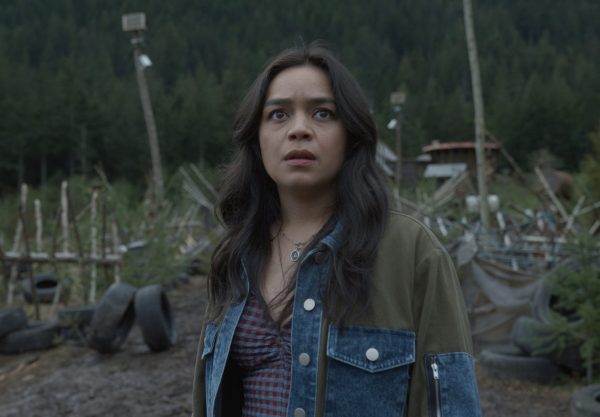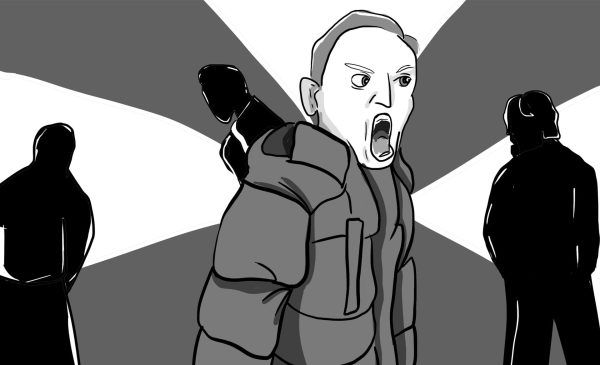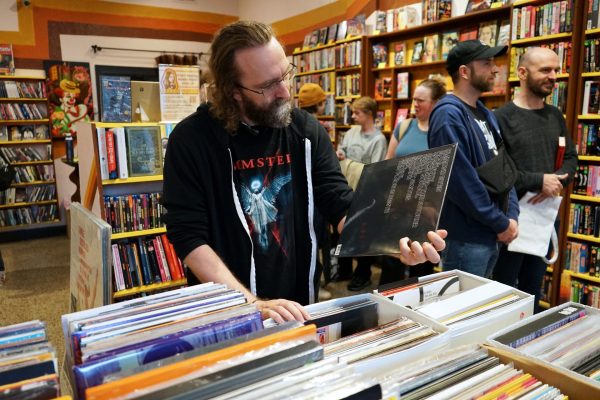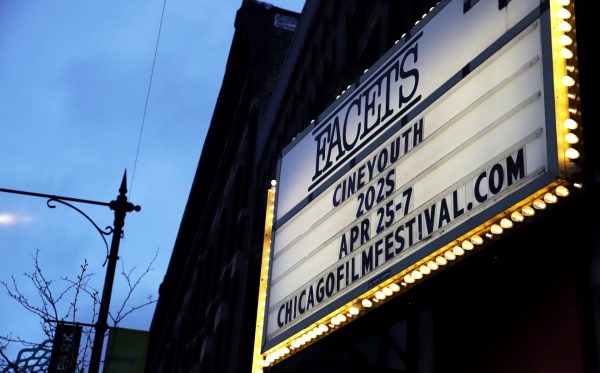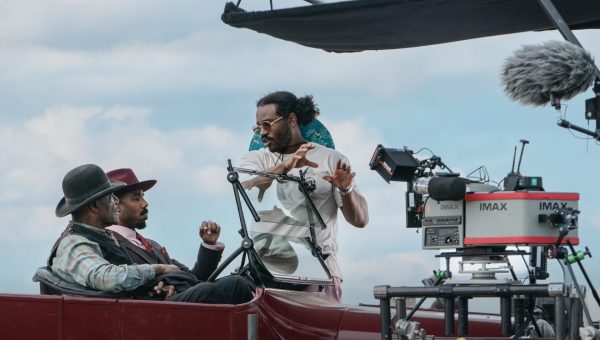‘Uncut Gems’ cements legacy of directors, actors
Giving us a character to root for in all of their just and honorable endeavors is an easy and often abundant scenario for most stories. But giving us a character with countless justifiable reasons for which to hate them — but simultaneously root for them — is a far different and continually difficult journey.
It’s one that Josh and Benny Safdie have been taking part in throughout their filmmaking expeditions. Directors enlisted Robert Pattinson as their apprehensive protagonist in 2017’s “Good Time,” with their focus on anxiety-inducing cinematography and sound design along with a perpetually intensifying tonal focus made for one of the most gripping films of that year.
The Safdie Brothers became a duo to look out for.
With “Uncut Gems,” they had the production assistance of Martin Scorsese as an executive producer, as well as Scott Rudin, a producer with a keen eye for Academy Award favorites. With much of big-Hollywood’s help, I was worried that the Safdie’s might sacrifice their electrifying cinematic vision for more practical and profitable attitudes. But once I saw the plot and the cast, I was dumbfounded at my slight doubt of these two.
The story follows Howie (Adam Sandler), a New York City jeweler who is as dedicated to selling as he is to making sports bets — ones that involve Kevin Garnett playing Kevin Garnett himself. Howie must balance his failing marriage, high-stakes bets and more amidst his addiction— not just gambling, but winning big at any cost.
The duo has done it again, making for a sensory blast of abrasive decisions, cringe-worthy encounters and unpredictable madness; the Safdie’s take deep pleasure in all the anxieties the audience experiences at the expense of Howie’s sanctifying climb toward each big win. The many dualities of Howie’s character are what makes this so engaging, just as similar dualities in Connie from “Good Time” made that journey so stirring. The Safdie’s, for the most part, take what worked and magnify it cinematically while also making its pace and enjoyment factor more mainstream without losing the unsettling tension that defines their distinct charm.
This time around, the story has more expressive and present characters than in their previous films, which adds the coherence necessary to make Howie and his circle of demeaned friends and family more sympathetic. Still, it draws away from the unrelenting volatility that made previous Safdie efforts like “Heaven Knows What” and “Good Time” so special. While a sustainable structure may seem like a fickle complaint, this is where I start to feel the impact of Rudin and other Hollywood honchos in the production process. During the post-film Q&A, the Safdie Brothers spoke on Rudin’s involvement, with it having a felt effect on the film’s final product.
“Scott Rudin got involved three years ago; he was very great in developing the script and he even would say that ‘you need a joke here,’” Josh Safdie said. “We had 165 drafts and a lot was helped by him.”
Even though Rudin is not listed as a writer, this side note adds a lot of context to the story’s comprehensible absurdity, despite draining a bit of the Safdie’s signature stylistic vigor.
The elephant in the room for “Uncut Gems” is the questionable decision of casting Adam Sandler as Howie, our protagonist, which is a character label that the Safide’s continue to question through their exploration of one man’s egocentric ambitions.
Everyone knows Adam Sandler — or at least they think they do. This is Sandler’s most demanding role for critical recognition since Paul Thomas Anderson’s “Punch-Drunk Love” in 2002. Howie is as decorated externally as he is internally, and my brain refused to believe that Sandler was the man who has continually been in films that seem to prance around his talent rather than embrace it.
Sandler’s portrayal of the risk-fueled Howie proves the actor’s inherent understanding of subtlety in both comedic and dramatic moments, with the comedy coming naturally from his gestures, inflections and other subtleties that make his performance more impersonation and less interpretation. The Safdie’s even spoke on Sandler’s necessary presence in the film and how they had to mold their vision around the actors that would be in it.
“No one else could be Howard,” Benny Safdie said. “This movie lives or dies on rooting for Howie to succeed, or not make certain decisions. You look at something like ‘Happy Gilmore’ and Sandler is so grounded in the role, you believe that stuff is happening to him.”
Other actors were in and out of the project; the directors had eyes on Harvey Keitel to play the lead at one point. But you never doubt their decision in casting and directing these actors who we believe are people, a feat that Benny and Josh Safdie are keen on expressing in their film.
In one scene early on, Sandler is seen trying to keep Kevin Garnett in his jewelry shop, a scene that demands drops of comedic flare without overdoing it, which is a line that Sandler balances gracefully throughout this scene and the rest of the over two-hour run time. This, along with the wonderfully calculated and appropriate appearances by Lakeith Stanfield and Idina Menzel, are just a few of the uncountable building blocks that amount to this atmospheric world — a world that feeds off of its engrossing characters and encounters as it does off of its technicality, with all of the claustrophobic cinematography and striking sound design for which I was truly hoping.
The rattling sound editing, mixing, score and overall manipulation of what sound does to audiences is back and better than ever. Oneohtrix Point Never, a singer-songwriter and composer, is back with his synth-led instrumentals that orchestrate thrilling scenes with almost as much emotion as the scenes themselves. The focus on the power of this score and all of the yelling and cursing filling the bloated soundscape emphasizes this sensory overload that makes every audible gasp in the theater so innately earned. During a scene in a nightclub where the trouble starts before Howie even enters the room, bass-boosted trap music, conversations, and glasses rattling are seamlessly interwound with audible conversations, a delicate detail that adds so much fleeting immersion.
New York City tales like “Taxi Driver” and “Do the Right Thing” are so classic because, like all great stories, they are told in two parts, as if the linear plot is an allegory for something else entirely all while building an urban environment that is as necessary to both omnipresent parts. “Uncut Gems” is enjoyable in the form of the latter, with so much more that will rattle future thrillers to their core. It’s a tale about a jewelry thief who is willing to risk almost everything in order to succeed, but at what cost? We are always striving to complete our next biggest accomplishment, but what do we really draw enjoyment from in our lives? Our friends and family? Or all the wealth that one can handle?
In “Uncut Gems”, monetary wealth is preferred over emotional wealth, a reflective theme that is conveyed through abnormally attractive methods at the hand of the tactile and ever-improving Safide Brothers, who craft a 21st-century tale of greed and grief in the most absurdly believable ways.


